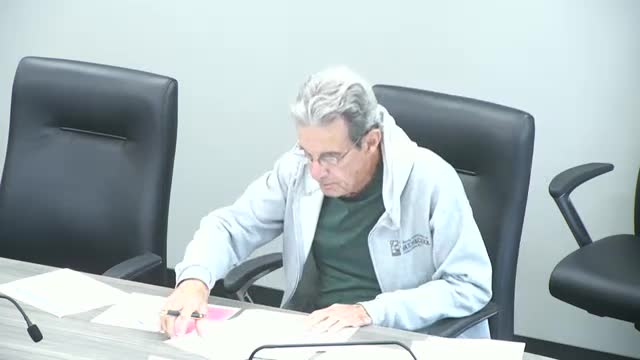Advisory committee directs staff to prioritize rooftop gardens and solar on new Denton City buildings; retrofit study deferred
Get AI-powered insights, summaries, and transcripts
Subscribe
Summary
The Sustainability Framework Advisory Committee voted to advance requiring rooftop/wall gardens and solar (with or without battery storage) in new construction; staff said existing buildings are largely unsuitable for cost-effective retrofits and that engineering assessments would be expensive.
Sustainability Framework Advisory Committee — Denton City — Oct. 24, 2025: The advisory committee voted to advance staff recommendations to require consideration of rooftop and wall gardens and rooftop solar with optional battery storage in future Denton City construction, while declining to commit large funding for retrofits of existing buildings.
The committee voted to “advance the recommendation, to approve, options 3 and 4 as presented,” which ask staff to (3) include rooftop/wall gardens on new construction when applicable and (4) include solar panels with or without battery storage on new construction. The motion passed on a voice vote after a member moved and another seconded the motion.
Committee members pressed Facilities and Fleet Services Director Tom Greenmer for details on feasibility and costs of retrofitting existing buildings. Greenmer said Denton City manages 206 buildings and identified 28 city buildings with parapet-style roofs that could potentially support rooftop gardens but noted an engineering survey would be required before adding load to any roof. He told the committee that engineering assessments for a single building typically run from about $50,000 to $200,000, and that solar-plus-battery retrofit costs vary widely by facility — roughly $100,000 to $1.8 million depending on energy use and building type. He estimated annual energy cost savings from rooftop solar at roughly $2,500 to $25,000 per facility, depending on historical consumption.
Greenmer said deferred maintenance needs and current capital budgeting limit the city’s ability to fund rooftop garden or solar retrofits across the existing portfolio. Facilities has so far invested roughly $25 million toward aging infrastructure after a multi-year deferred-maintenance capital plan that originally sought approximately $30 million over three to four years. For many existing buildings, Greenmer cautioned, "if you touch it, you have to repair it," meaning structural or electrical upgrades uncovered during retrofit work can trigger broader renovation needs and added cost.
Given those constraints, staff recommended and the committee agreed it is more cost-effective to integrate gardens and solar during the design phase of new buildings. Greenmer said architects for new projects will be asked to include rooftop/wall garden and solar options in initial design specifications so the city can evaluate return on investment during design and budget decisions. Committee members and staff discussed some near-term building projects — including fire stations and branch libraries that are at various stages of design — and agreed that where design is already advanced, adding these features may not be feasible without raising costs.
Committee members also raised alternative approaches that avoid building retrofits, including siting solar over parking lots and pursuing grant funding for solar-plus-EV infrastructure. Greenmer confirmed facilities management now oversees parking-lot renovation work and will consider covered solar parking and EV-charging opportunities when lots are reconstructed.
The committee asked staff to seek budget authority in the FY 26–27 process if members decide later to fund engineering assessments of selected existing buildings; however, the committee’s current action directs staff to pursue options 3 and 4 (new construction inclusion) rather than a city-wide retrofit program.
What’s next: Staff will incorporate the committee’s direction into capital project specifications and discussions with capital projects and finance. Any retrofit work on existing buildings would require separate funding allocations and specific engineering assessments before construction.
